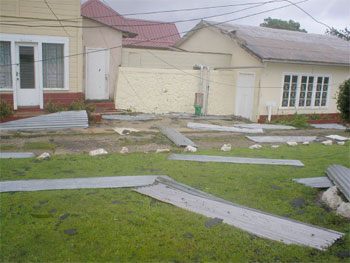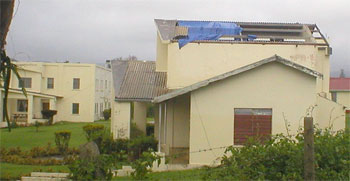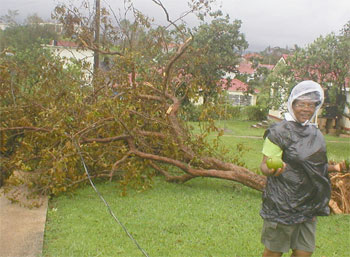October 1, 2004
|



Scenes from Jamaica Bible College. The bottom picture shows Frances Gordon, wife of JBC President Owen Gordon.
Owen Gordon, a UB minister and president of Jamaica Bible College, sent this information on September 28:
“Our first week of classes went well without electricity and water. Thankfully, we got back electricity and water over the weekend. These, along with telephone. occasionally go off, but we are grateful. We are slowly rising again! Three friends are here from Canada to help us with general clean up. We hope to try to start putting back the library roof sometime next week.
“Special request: Prayer for our students who are exhibiting signs of the effect of post hurricane trauma. One young lady broke down in tears yesterday as her dream of coming to school has been shattered when the hurricane took away everything. Continue to keep us close in prayer and thanks for the many expressions of help.”
“This is my first attempt to send some information since Ivan’s passage. First, thank God for His protection! Thank you all for your loving concern and your earnest and effectual prayers. We are battered, bruised, but thankfully alive!
Bishop Emeritus Wilber and Mossie Sites are also at Jamaica Bible College, serving as volunteers this fall. Bishop Sites wrote the following on September 27:
“Things are slowly returning to normal. We now have all our utilities back, but every day we lose electricity from a few minutes to four to six hours. We had a three-man team come from Southridge Community Church last Tuesday and they have been using power saws to clean up trees, etc. Before they arrived some of the workmen worked several days doing the dame thing. Another team from the same church is to come on Saturday, if we have gotten the roofing materials. The supplier promised to have it to us on Friday. Other teams have volunteered to come later in October and will probably work on the interior of the damaged buildings.”
“Our first week of classes went well without electricity and water. Thankfully, we got back electricity and water over the weekend. These, along with telephone, occasionally go off, but we are grateful. We are slowly rising again! Three friends are here from Canada to help us with general clean up. We hope to try to start putting back the library roof sometime next week.
“Special request: Prayer for our students who are exhibiting signs of the effect of post hurricane trauma. One young lady broke down in tears yesterday as her dream of coming to school has been shattered when the hurricane took away everything. Continue to keep us close in prayer and thanks for the many expressions of help.”



